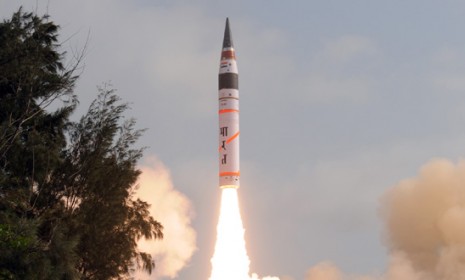India's long-range missile test: 4 takeaways
Just days after North Korea's failed launch, India celebrates the successful firing of a nuclear-capable intercontinental missile. Just how significant is this milestone?

This week, India pulled off a "flawless" test launch of its first homegrown, three-stage intercontinental ballistic missile. The milestone put India in an elite club of nations that have nuclear weapons and the means to deliver them to faraway targets, marking what the missile's creators called a "quantum leap in India's strategic capability." Yet the test of the 55-foot-tall Agni V missile caused little international concern — a stark contrast to the outrage over North Korea's failed missile launch just days earlier. How significant was India's big achievement? Here, four key points to consider:
1. This is a major deterrent to China
India's Agni (Sanskrit for "fire) can carry a 1-ton nuclear warhead 3,100 miles, says Krista Mahr at TIME, which puts major Chinese cities such as Beijing and Shanghai within the reach of India's military. That's nice leverage for a country that shares a 2,500-mile, disputed border with China, and represents a big step forward in "India's effort at nuclear deterrence in the region, a defense strategy widely interpreted as a response to China's military buildup and ongoing tensions with Pakistan."
The Week
Escape your echo chamber. Get the facts behind the news, plus analysis from multiple perspectives.

Sign up for The Week's Free Newsletters
From our morning news briefing to a weekly Good News Newsletter, get the best of The Week delivered directly to your inbox.
From our morning news briefing to a weekly Good News Newsletter, get the best of The Week delivered directly to your inbox.
2. But New Delhi would lose an arms race with Beijing
"India should not overestimate its strength," says Global Times, China's official state English-language website. Nor should India take too much comfort in the "value of its Western allies," who are choosing to overlook New Delhi's "disregard of nuclear and missile control treaties." And even if India can, in theory, hit Chinese cities, it won't "gain anything from being arrogant during disputes with China." India is still poor, and "China's nuclear power is stronger and more reliable." If India starts an arms race with China, it will lose.
3. North Korea's failure is scarier than India's success
"Although India's launch was successful and North Korea's wasn't," says Margherita Stancati at The Wall Street Journal, "the Agni V test was seen as a lot less worrying than Pyongyang's 80-seconds-and-it's-over belly flop." The global community believes that New Delhi can be trusted to respect a "no-first-use policy on its missiles." But judging by Pyongyang's bellicose rhetoric, "it's less obvious that [North Korea] wouldn't be the first mover in a potential missile standoff."
A free daily email with the biggest news stories of the day – and the best features from TheWeek.com
4. The U.S.-India relationship has really changed
Washington's muted reaction was "a far cry from the Clinton-era response in the 1990s," says Chidanand Rajghatta in the Times of India. Back then, "India's missile tests were routinely criticized and its nuclear tests in 1998 brought in its wake international opprobrium and sanctions." This time, the State Department responded by talking up America's "very strong strategic and security partnership with India," and praised India for its non-proliferation record. Clearly, India's track record and China's missile-technology exchanges with North Korea and Pakistan have changed the game.
-
 Moon dust has earthly elements thanks to a magnetic bridge
Moon dust has earthly elements thanks to a magnetic bridgeUnder the radar The substances could help supply a lunar base
-
 World’s oldest rock art discovered in Indonesia
World’s oldest rock art discovered in IndonesiaUnder the Radar Ancient handprint on Sulawesi cave wall suggests complexity of thought, challenging long-held belief that human intelligence erupted in Europe
-
 Claude Code: the viral AI coding app making a splash in tech
Claude Code: the viral AI coding app making a splash in techThe Explainer Engineers and noncoders alike are helping the app go viral